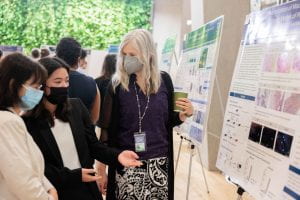The following blog post was written by fellow UHPer and Spring 2023 SURE Award recipient, Peri Wivell (Biology -Cellular and Molecular concentration Major, ’23). Read on about how Peri plans to utilize the SURE Award funding to further expand upon her research experience!
Getting involved in research has always been a top priority for me throughout my undergraduate experience. I joined Dr. Maho Shibata’s lab in the GW Cancer Center during my sophomore year. Our lab applies concepts from developmental biology and stem cell biology to prostate cancer research. We use genetically engineered mouse models, explant cultures, and 3D organoid culture systems to study androgen signaling during prostate development, and to identify novel molecular drivers of castration-resistant prostate cancer. Under the mentorship of Dr. Shibata and her team, I learned several techniques essential to conducting effective research and started working on my own research project in spring of 2021.
My research involves studying the role of macrophage populations during development and in diseases of the prostate. Macrophages are specialized cells involved in a host of immune functions and have been known to play an important role in both pro- and anti- inflammatory responses. Benign Prostatic Hyperplasia (BPH) is a common diagnosis affecting the aging male population with increasing prevalence and although the disease has become progressively common, its cause and mechanism of progression remain poorly understood. Because BPH is a disorder influenced by inflammation and the origin of macrophages in the prostate has not been fully elucidated, understanding the recruitment of macrophage populations could lead to the development of more effective treatments and therapies than those which currently exist.
Over this past summer and academic school year, I have been designing experiments, dissecting and embedding samples, conducting immunohistochemical and immunofluorescence staining on tissue sections to get a better understanding of the role these cells play on a microscopic level. In addition to gaining experience in conducting laboratory research and working with genetic model organisms, I’ve also improved my scientific communication and writing skills. This past summer, I presented my findings on the involvement of macrophages in different mouse models of prostatic diseases at the Summer Program Advancing Research on Cancer (SPARC) poster session. It was a wonderful opportunity for me to share my research with, while simultaneously learning from, other students and faculty working in different areas of cancer biology.
Because my research project requires daily/multi-day time-sensitive experiments, this makes summer an ideal time to make significant progress as I am able to work in the lab full time. With the support of the SURE award, I will continue to work on my project and use my findings to complete my senior thesis. Working in Dr. Shibata’s lab has been an invaluable part of my undergraduate experience and has not only helped me in my academic pursuits, but has also contributed significantly to my preparation for fulfilling my professional goals. I am hopeful that our research will lead to the development of more effective methods to prevent, detect, diagnose and treat cancer along with other diseases.
Interested in applying for your own SURE Award funding? Find out more about the application process here!



